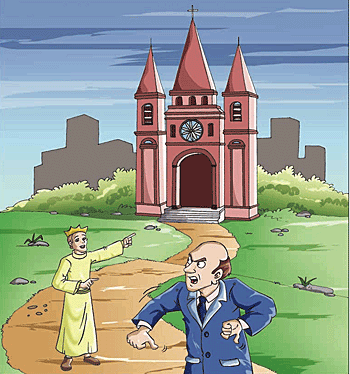theo-, the-, -theism, -theist, -theistic
(Greek: God, god, deity, divinity, divine)
Someone who hates both God and mankind.


A priest is trying to encourage a man to attend church, but the man is showing his hatred for both religion and apparently for people who are participants in church functions.
theomorphic (adjective)
Being in the form or likeness of a deity; having a godlike form or aspect.
1. A presentation or a condition of being in the image or likeness of God.
2. That which is shaped or formed like a deity or a god.
2. That which is shaped or formed like a deity or a god.
A story or presentation that includes a mixture of religion and mythology: "Theomythology may include stories about supernatural beings and beliefs that some people have, or have had, even when they are not considered to be true."
theonomous (adjective)
Related to being governed by God or being subject to God's authority.
1. The status of being governed by God, a god, or by priests: "The rulership by God or a government formed by God or priests."
2. A situation in which an individual or society regards its own characters and behaviors as being in accord with divine nature or with God's will.
2. A situation in which an individual or society regards its own characters and behaviors as being in accord with divine nature or with God's will.
The doctrine that God is all that exists.
theopathetic (adjective), more theopathetic, most theopathetic
Related to the sympathetic passive feeling excited by the contemplation of God; pertaining to the susceptibility to this feeling:
A theopathetic sensation refers to the sensitiveness or responsiveness to a divine influence or to a feeling of pious sentiment.
A theopathetic emotion or excitement is caused by thinking about God.
theopathic (adjective)
A reference to religious emotions that are started by and excited by the contemplation of or meditation upon God: "A theopathec person is someone who has a capacity to worship a Deity or to experience religious beliefs."
An intense or abnormal absorption in matters pertaining to God: Theopathy is a sympathetic passive feeling excited by the contemplation of God, including a susceptibility to this feeling.
1. The eating of God (in the mass or communion rite).
2. In anthropology, the eating of meals at which the participants believe that they ingest a deity with the consecrated food.
2. In anthropology, the eating of meals at which the participants believe that they ingest a deity with the consecrated food.
theophagous (adjective)
The practice of ingesting a god: "The theophagous term most likely came from the ancient habit of eating a sacred animal to secure a blessing, a grace, and an identity with the deity."
1. The practice or ritual eating of a god, or of the thing symbolizing god, such as a sacrament.
2. The eating of God (in the mass or communion rite); the communion.
3. In anthropology, the eating of meals at which the participants believe that they are ingesting a deity as part of the consecrated food.
2. The eating of God (in the mass or communion rite); the communion.
3. In anthropology, the eating of meals at which the participants believe that they are ingesting a deity as part of the consecrated food.
theophanic (adjective)
1. A reference to the appearance of a god in a visible form to a human being.
2. A description of the manifestation or appearance of God, or a god, to humans.
2. A description of the manifestation or appearance of God, or a god, to humans.
theophanous (adjective)
A reference to the visibility or appearance of God, or a deity, to a human.
If you would like to take self-scoring quizzes over many of the words in this section, then click on these Theo Quizzes so you can see how much you know about the following "theo-, -theism" words.
Related religious-word units: church; dei-, div-; ecclesi-; fanati-; hiero-; idol-;-olatry; zelo-.


